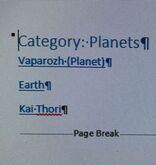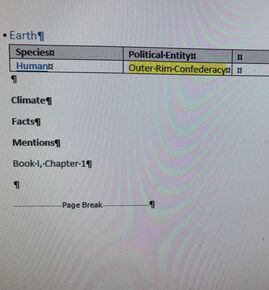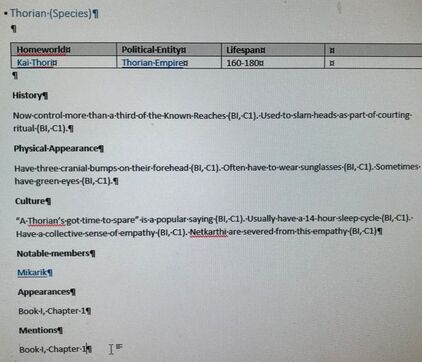Silver Wordsmith: An author's journey |
|
Pretty much the same day that I posted my last entry, it had become out of date. For those that don’t want to reread it, the lightning fast summary is that I explained that the reason I was so slow writing Chapter 2 of Drops of the Black Sun is because I was afraid of losing track of the lore and needed to find a user-friendly way of cataloguing it. So at the end of the entry I concluded that Excel was the way to go, and since I had been populating my spreadsheet for a couple of weeks by that point, I thought I had settled on a strategy. This all came crashing down later that afternoon, where I hit a particularly lore-heavy part of my story and realized that the spreadsheet was becoming a disaster. Just look at the below, and consider that this is about four pages into an idea that’s hundreds, if not thousands, pages long:  I’m not entirely sure I why I failed to realize this amount of information will completely overwhelm a table, but I’m not shy about admitting when I was a doofus. So this doofus needed an alternative, and so I went back to my original concept of a wiki-type file. This time I got off my lazy ass and Googled whether and how you can create internal hyperlinks in Word. You can, and it’s especially easy when you use headings. So now instead of saving time and moving on with my writing, I’ve been busy transferring all the data I already put in Excel, and then organizing into something that I can actually work with. So far, it’s working much better. Sure, it’s already 17 pages long and 500 words even though I still haven’t quite gotten through half of Chapter 1 yet. And sure, deep down in my gut there is this feeling that once the document grows too big, it will implode on me. But this is the best I can do with the resources I have available. And I know “Word” is a bit of a taboo world in writing circles, but I figured I’d give you a tour anyway. So here you can see where the wiki inspirations shines through. I’ve got category pages that list all entities in the category, and then links coming off that list to the actual entries.  And here you see a sample entry with the information table at the top – some of the columns are placeholders in case I come up with other characteristics by which I want to distinguish planets from each other. The yellow highlight is a reminder to myself that this fact hasn’t actually made it into the work yet. So there you go, a sneak peak at a minor detail. As you can see, I also want to track where the entity has been mentioned in case I want to read up on what was actually said, rather than what made its way into this encyclopedia entry.  And here we see a sample of an entry that’s more “filled-out”, with the table above and the subheadings a bit more populated. “(BI, C1)” is a shorthand for “Book I, Chapter 1” and operates as an internal “cite your sources” function. Again, so I can check back and figure out what the hell I was actually talking about. So there you go, my adventures in worldbuilding continue, and hopefully I won’t have to change course any time soon. Meanwhile, going to go wish on a star that I can actually start writing this again soon.
0 Comments
Lately I’ve been feeling a bit like George R. R. Martin, if Martin had wrote the first chapter of A Game of Thrones and then promptly fucked off the face of the Earth. Success seems to be a favourite prey of ambition. One of my major follies is building up myself a lofty goal and then getting buried by the inevitable avalanche that follows. The only solution is then to burn the ruins to the ashes and move onto the next overwhelming task.
About three months ago, I ambitiously started my science fiction project, The Bloodlet Sun, which I planned to release as a web novel on this blog. Usually I’m a non-genre writer, but I’ve always had a soft spot for science fiction, so I figured I could write it off the side of my desk and share it with the rest of the world in an unhurried fashion. In mid-March, I finished posting Chapter 1. Almost three months later, Chapter 2 is a work in progress, and like George Martin, I am filled with wholehearted promises to get my audience the next installment. In the meantime, instead of being content with tweets of lamentation, I figured I’d share in a bit more detail what I’ve been going through the last couple of months in terms of the creative process, and hopefully the other writers out there can glean something useful out of my experience. First and foremost I want to say, I haven’t given up on the project, nor has it turned into a chore, which is one of the reasons why it’s been progressing so slowly. I didn’t want to be buried by the weight of my own ambition in this case. Instead, I carefully took a measured approach to keep my joy alive and to keep some kind of semi-regular release schedule. This turned out a bit harder than I thought, and the main culprit is quality control. It is far easier to be mediocre than good. So while the plot outlines and character arcs existed as networks of interconnected neurons in my own mind, they were difficult to scrutinize. But now that they were made flesh by writing them down, they needed to meet a standard. I knew I wasn’t planning to make it as polished as my traditional stuff, but that was still no excuse to make it sloppy. There were standards I needed to meet before I could share my work with others. So that was one of the issues I face – “writing as I go” isn’t as easy as I thought when an involved editing process was going to be a crucial part of it. The bit of pressure I feel to continue to share the work does take the edge off the editing trap – revising and revising until your figurative knuckles turn bloody – but any way you spin it, editing is still not my favourite part of the writing process and it grinds along. The other major issue that has been bugging me is worldbuilding. Which is funny, because in my introduction to Drops I explain that incessant worldbuilding is the reason I threw up my hands in the first place and started to write instead of plot the story to death. In a way, this reason is related to the first – quality control. My world needs to be polished and consistent, and I can’t risk being blindsided by neglected details. I thought setting out to write was all I had to do. Yet not even two chapters into the endeavour I discovered that whereas worldbuilding without writing would not satisfy me, writing without a careful eye to worldbuilding is just as unsatisfactory. I don’t know how the great worldbuilders do it, but I doubt they have a catalogue of all their world’s minutiae stored in their head. It’s not a task that my mind is up for and I already caught myself either thinking that I introduced something when I didn’t, and introducing something I thought I didn’t share but actually established in the previous chapter. I realized that I couldn’t move ahead at a good pace because I was worried about messing this up. Anytime I namedrop a species or a planet, I need to make sure I record this instance. Both for consistency, and to avoid repetition and unnecessary exposition every time something comes up. Every little fact and name needed to be cataloged. So where I thought that setting out all this detail in advance wouldn’t work for me, neither would I be successful if I didn’t set out this detail after had I introduced it through my writing. So now that the problem had been identified, I needed to look for a solution. Something that could replicate the ease of navigation of a wiki but be stored on my computer. Now, there is probably an app out there that would do a better job, but I’m a simple man – I need to record stuff, I go to Excel. So over the last little while, all those times where I otherwise I would have worked on chapter 2, I’ve been putting together this lore repository that I myself could consult. Everything is separated into tabs by characters, planets, species, objects, etc. And in each of those tabs I record everything said on the subject as well as the precise chapters where they were referenced. It’s a bit of a painstaking process to build up, but I’m hoping that once I have the base, it will go a little quicker and won’t slow down my writing too much. My main goal here is using consistency to bring the world to life and keep the reader immersed. Now let’s hope the story itself can do the same thing. So there you have it, some of the misadventures behind this unfortunate delay. I admit it’s a bit of a learning process, but I’m still committed to the story. Hope to see you for the release of the next chapter, whenever that might be. |
Michael SerebriakovMichael is a husband, father of three, lawyer, writer, and looking for that first big leap into publishing. All opinions are author's own. StoriesUrsa Major Categories
All
Archives
January 2024
|
Proudly powered by Weebly

 RSS Feed
RSS Feed